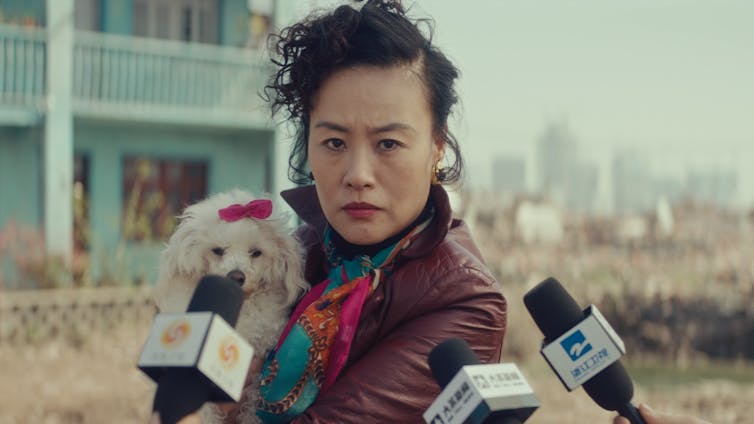European film festivals could learn a lot from London’s diplomatic approach to Chinese cinema
3 December 2018
BFI London Film Festival
Hiu Man Chan, School of Journalism, Media and Culture
The 2018 BFI London Film Festival featured a spectacular programme of 225 films from 77 different countries. A wonderful showcase in its entirety, but this was also the largest showcase of Chinese cinema in the film festival’s history. Bettering the renowned Cannes, Venice and Berlin festivals, London introduced a nuanced line up of films made in China.
Instead of relying on one or two Chinese directors who are already established on the European film festival circuit, filmmakers at different stages of their careers were chosen. Jia Zhangke’s Ash is Purest White, Cathy Yan’s Dead Pigs, and Ying Liang’s A Family Tour were shown. As was Guo Xiaolu’s Five Men and a Caravaggio, Bi Gan’s Long Day’s Journey into Night, Zhang Yimou’s Shadow and Qiu Sheng’s Suburban Birds.
Zhang is the “old brother” in the business, and one of the first Chinese directors to be recognised by Western critics. His Golden Bear award win for Red Sorghum at the 1998 Berlin International Film Festival launched him onto the international stage. Although arguably since Hero (2002) his films have not lived up to the expectations of critics as much as before, his invaluable contribution to Chinese cinema’s international reputation lingers.
Jia meanwhile has also seen success at European film festivals. Venice and Cannes have been his loyal promoter since 2000, and most of his films have been welcome in the major competitions. But he is considered part of the next generation of filmmakers, who gained attention from Western critics after Zhang, and established a different aesthetic style. Zhang has impressed with adaptations of Chinese village stories that reveal the feudalist repression from old Chinese society. Jia gained his Western fans through his hand-held camera style, with narratives focusing on ordinary people in urban China. Though both have moved on to make much bigger productions after becoming famous.
Admittedly, it was a safe bet for the London festival to include the latest films by two of the China’s most well-known directors. It follows the usual festival taste in auteurs by recognising the legacy of both directors. However, they have gone against the grain too, by opting to introduce a handful of “new” directors to the international film buffs, such as American-Chinese director Cathy Yan.
Though it had a positive reception at the 2018 Sundance Film Festival, neither Yan nor her films are well known in Europe. Likewise, Ying Liang, Bi Gan and Qiu Sheng are considered emerging independent, arthouse filmmakers in China – particularly Bi Gan, thanks to his 2015 film Kaili Blues. But none have secured major screenings outside of Asia to date.
A fresh take
The London festival didn’t stop there, however. Rather than just opting for unique Chinese arthouse films, like other European film festivals do, it chose to actively promote fresh content. Guo’s UK-Chinese co-produced documentary Five Men and a Caravaggio was a different choice, and a celebration of the British-Chinese author’s contribution toward local culture, as well as the international industry.
Looking at the selection of films together, it becomes apparent that the festival strategically included almost as many representative figures of Chinese cinema as possible. The movies considered perspectives from different generations, the sensitivity of regional politics, and included a diverse range of Chinese identities. Rather than opting for what some might call the typical Orientalist narratives and visual styles that have been a hit in Europe before, the London event presented a balanced, thoughtful programme which promoted a more contemporary view of Chinese cinema and modern China.
London’s film festival has taken a major step forward this year. Its proactive approach was perhaps the best way for Chinese films to be introduced to an audience outside the country. This was a showcase opportunity that was not based on over ambitious platforms funded by the Chinese government – like the China-Britain Film Festival is – nor did it only cater to a selective taste, as has been done by other European film festivals.
While other established European festivals such as Cannes have simply looked to use acting stars to promote themselves to Chinese film fans, the London festival has started a strategy for long term audience development.
Such style and diplomacy in programming Chinese cinema, it is perhaps only possible as a first in London.![]()
This article is republished from The Conversation under a Creative Commons license. Read the original article.
- June 2024
- March 2024
- February 2024
- November 2023
- September 2023
- June 2023
- May 2023
- January 2023
- December 2022
- November 2022
- October 2022
- September 2022
- July 2022
- May 2022
- April 2022
- January 2022
- December 2021
- November 2021
- August 2021
- July 2021
- June 2021
- February 2021
- January 2021
- November 2020
- October 2020
- September 2020
- August 2020
- July 2020
- June 2020
- April 2020
- March 2020
- February 2020
- January 2020
- December 2019
- November 2019
- October 2019
- September 2019
- August 2019
- July 2019
- June 2019
- May 2019
- April 2019
- March 2019
- February 2019
- January 2019
- December 2018
- November 2018
- October 2018
- September 2018
- August 2018
- July 2018
- June 2018
- May 2018
- April 2018
- March 2018
- February 2018
- Biosciences
- Careers
- Conferences
- Development
- Doctoral Academy Champions
- Doctoral Academy team
- Events
- Facilities
- Funding
- Humanities
- Internships
- Introduction
- Mental Health
- PGR Journeys
- Politics
- Public Engagement
- Research
- Sciences
- Social Sciences
- Staff
- STEM
- Success Stories
- Top tips
- Training
- Uncategorized
- Wellbeing
- Working from home